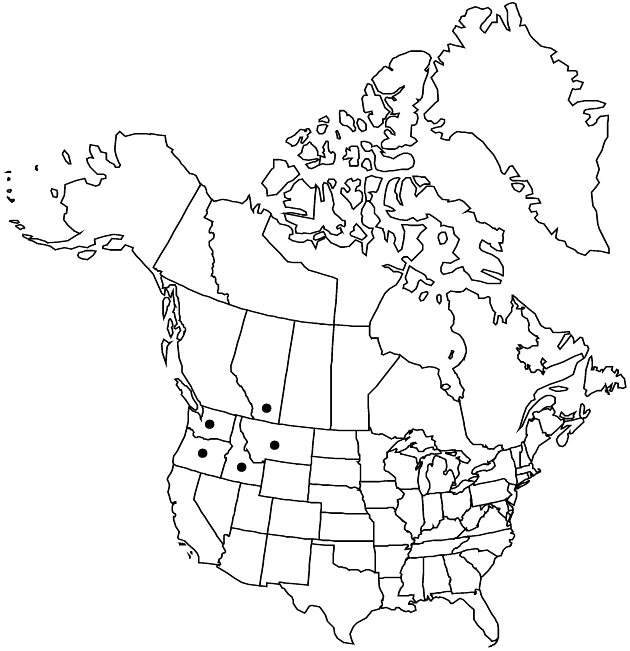Difference between revisions of "Symphyotrichum cusickii"
Phytologia 77: 278. 1995.
FNA>Volume Importer |
FNA>Volume Importer |
||
| Line 11: | Line 11: | ||
|name=Aster cusickii | |name=Aster cusickii | ||
|authority=A. Gray | |authority=A. Gray | ||
| + | |rank=species | ||
|publication_title=Notes Compositae, | |publication_title=Notes Compositae, | ||
|publication_place=99. 1880 | |publication_place=99. 1880 | ||
| Line 17: | Line 18: | ||
|name=Aster foliaceus var. cusickii | |name=Aster foliaceus var. cusickii | ||
|authority=(A. Gray) Cronquist | |authority=(A. Gray) Cronquist | ||
| + | |rank=variety | ||
}} | }} | ||
|hierarchy=Asteraceae;Asteraceae tribe Astereae;Symphyotrichum;Symphyotrichum subg. Symphyotrichum;Symphyotrichum sect. Occidentales;Symphyotrichum cusickii | |hierarchy=Asteraceae;Asteraceae tribe Astereae;Symphyotrichum;Symphyotrichum subg. Symphyotrichum;Symphyotrichum sect. Occidentales;Symphyotrichum cusickii | ||
| Line 41: | Line 43: | ||
-->{{#Taxon: | -->{{#Taxon: | ||
name=Symphyotrichum cusickii | name=Symphyotrichum cusickii | ||
| − | |||
|authority=(A. Gray) G. L. Nesom | |authority=(A. Gray) G. L. Nesom | ||
|rank=species | |rank=species | ||
| Line 56: | Line 57: | ||
|publication year=1995 | |publication year=1995 | ||
|special status= | |special status= | ||
| − | |source xml=https://jpend@bitbucket.org/aafc-mbb/fna-data-curation.git/src/ | + | |source xml=https://jpend@bitbucket.org/aafc-mbb/fna-data-curation.git/src/eaa6e58056e40c9ef614d8f47aea294977a1a5e9/coarse_grained_fna_xml/V19-20-21/V20_1183.xml |
|tribe=Asteraceae tribe Astereae | |tribe=Asteraceae tribe Astereae | ||
|genus=Symphyotrichum | |genus=Symphyotrichum | ||
Revision as of 19:24, 16 December 2019
Perennials, 40–100 cm, colonial or cespitose; long-rhizomatous. Stems 1–5+, ascending to erect, glabrous or puberulent. Leaves thin, margins entire, apices acute, faces glabrous or puberulent; basal often withering by flowering, petiolate, blades broadly elliptic to obovate, 5–200 × 10–35 mm, attenuate or cuneate, margins entire, apices acute; proximalmost cauline sometimes withering by flowering, sessile, blades oblanceolate to obovate, 70–120 × 15–50 mm, bases strongly clasping, enlarged and usually narrowed distally, usually prominently auriculate, margins entire, apices acute; distal sessile, blades lanceolate to broadly elliptic, 30–110 × 10–30 mm, bases truncate or auriculate, margins entire. Heads borne singly or in often congested, paniculiform arrays, branches 20–30 cm. Peduncles sparsely to densely cinereous, bracts lanceolate. Involucres campanulate, 10–20 mm. Phyllaries in 4–5 series, broadly to narrowly lanceolate or oblanceolate (outer) to linear (inner), ± equal or outer slightly exceeding inner, bases outer foliaceous, inner scarious, margins scarious, entire or erose, green zones elliptic to lanceolate, apices acute, faces glabrous or finely hairy. Ray florets 25–55; corollas violet, laminae 10–18 × 1–2 mm. Disc florets 60–150+; corollas yellow, 2.5–4 mm, lobes triangular, 0.4–0.5 mm. Cypselae brown, cylindric to obovoid, not compressed, 3–3.5 mm, 3–6-nerved, faces hairy; pappi white, 5–9(–11) mm. 2n = 16, 32.
Phenology: Flowering Jul–Aug.
Habitat: Damp meadows in dry forests, often near springs and streams
Elevation: 1000–1500 m
Distribution

Alta., Idaho, Mont., Oreg., Wash.
Discussion
Symphyotrichum cusickii occurs principally in north-eastern Oregon, north-central Idaho, and adjacent western Montana.
Selected References
None.